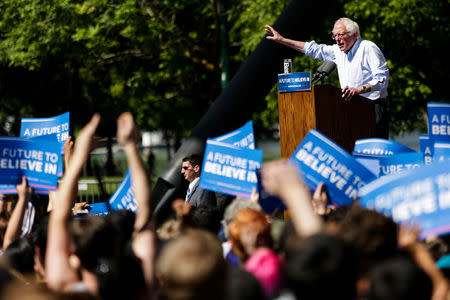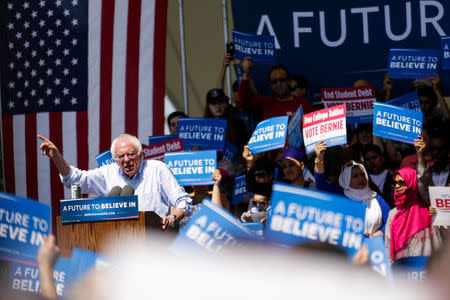Sanders plan raises incomes but also U.S. deficits, analysts say
By Jonathan Allen and Luciana Lopez NEW YORK (Reuters) - U.S. Democratic presidential candidate Bernie Sanders' tax and benefit plans would raise income for most Americans but his proposal for single-payer healthcare would help generate record federal deficits, two Washington think tanks said on Monday. An analysis by the Tax Policy Center said that although most people would pay higher taxes under Sanders' plan, the average household income would increase by nearly $4,300 in 2017 after his proposed benefits were factored in. Those benefits include an expansion of the Social Security government pension plan, paid family leave and free tuition at public colleges, ideas that have generated support for Sanders, a U.S. senator from Vermont, as he seeks to become the Democratic nominee for the Nov. 8 presidential election. Only the wealthiest 5 percent of households would end up paying more in new taxes than they got back in benefits, according to the center, a joint effort run by two Washington-based think tanks, the Urban Institute and the Brookings Institution. But Sanders' plans would also increase federal deficits to "unprecedented levels," the center said, relying largely on a new estimate of the cost of his healthcare proposals published on Monday in a separate analysis by the Urban Institute. Sanders has proposed a single-payer healthcare system, a more significant overhaul than the tweaks that Democratic front-runner Hillary Clinton wants to make to the Affordable Care Act, a signature policy achievement of Democratic President Barack Obama. The Urban Institute estimated Sanders' healthcare plan would require an increase in federal spending of $32 trillion over the next decade but that new revenue sources proposed by Sanders only covered just under half of that amount. The overall result would be an increase in annual federal budget deficits by $18 trillion over the next decade, the Tax Policy Center said. Warren Gunnels, Sanders' policy director, called the new cost estimate "wildly" overestimated in a statement on Monday. He said the analyses were wrong to assume that state and local governments would stop their own spending on healthcare, thereby shifting $4.1 trillion in costs to the federal government. Gunnels said the reports also underestimated what the Sanders campaign forecast would be trillions of dollars in savings in administration, paperwork and drug prices seen in other Western countries with single-payer systems. The Sanders campaign has estimated that his proposed healthcare system would save more than $6 trillion over the next 10 years, compared with the current system. (Reporting by Luciana Lopez and Jonathan Allen; Editing by Peter Cooney)




